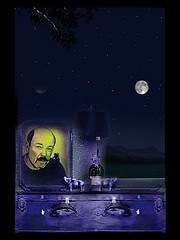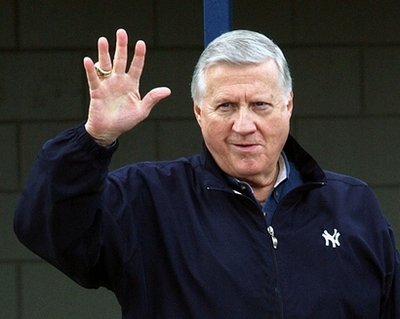NEW YORK – George Steinbrenner, whose big wallet and win-at-all-cost attitude whipped the New York Yankees into a billion-dollar sports empire, died Tuesday. He had just celebrated his 80th birthday July 4.
Steinbrenner had a heart attack, was taken to St. Joseph’s Hospital in Tampa, Fla., and died at about 6:30 a.m, a person close to the owner told The Associated Press. The person spoke on condition of anonymity because the team had not disclosed those details.
“George was ‘The Boss,’ make no mistake,” Hall of Famer Yogi Berra said. “He built the Yankees into champions, and that’s something nobody can ever deny. He was a very generous, caring, passionate man. George and I had our differences, but who didn’t? We became great friends over the last decade and I will miss him very much.”
In 37-plus seasons as owner, Steinbrenner led the Yankees to seven World Series championships, 11 American League pennants and 16 AL East titles.
“He was and always will be as much of a New York Yankee as Babe Ruth, Lou Gehrig, Joe DiMaggio, Mickey Mantle, Yogi Berra, Whitey Ford and all of the other Yankee legends,” baseball commissioner Bud Selig said. “Although we would have disagreements over the years, they never interfered with our friendship and commitment to each other. Our friendship was built on loyalty and trust and it never wavered.”
Steinbrenner’s death on the day of the All-Star game was the second in three days to rock the Yankees. Bob Sheppard, the team’s revered public address announcer from 1951-07, died Sunday at 99.
New York was 11 years removed from its last championship when Steinbrenner headed a group that bought the team from CBS Inc. on Jan. 3, 1973, for about $10 million.
He revolutionized the franchise — and sports — by starting his own television network and ballpark food company. Forbes now values the Yankees at $1.6 billion, trailing only Manchester United ($1.8 billion) and the Dallas Cowboys ($1.65 billion).
“He was an incredible and charitable man,” his family said in a statement. “He was a visionary and a giant in the world of sports. He took a great but struggling franchise and turned it into a champion again.”
He ruled with obsessive dedication to detail, overseeing everything from trades to the airblowers that kept his ballparks spotless. He admittedly was overbearing, screaming at all from commissioners to managers to secretaries.
His reign was interrupted for suspensions, including a 15-month ban in 1974 after his guilty plea to conspiring to make illegal contributions to President Richard Nixon’s re-election campaign. He was pardoned 15 years later by President Ronald Reagan.
The son of a shipping magnate, Steinbrenner lived up to his billing as “the Boss,” a nickname he earned and clearly enjoyed as he ruled with an iron fist. While he lived in Tampa he was a staple on the front pages of New York newspapers.
“He was truly the most influential and innovative owner in all of sports,” former New York Mayor Rudy Giuliani said. “He made the Yankees a source of great pride in being a New Yorker.”
Steinbrenner’s mansion, on a leafy street in an older neighborhood of south Tampa, was quiet Tuesday. Private security guards milled around on the empty circular driveway inside the gates. A police officer turned away reporters along the narrow street. News vehicles lined the other side of the street.
“The passing of George Steinbrenner marks the end of an era in New York City baseball history ” rival Mets owners Fred and Jeff Wilpon and Saul Katz said. “George was a larger than life figure and a force in the industry.”
Steinbrenner was known for feuds, clashing with Berra and hiring manager Billy Martin five times while repeatedly fighting with him. But as his health declined, Steinbrenner let sons Hal and Hank run more of the family business.
Steinbrenner was in fragile health for years, resulting in fewer public appearances and pronouncements. Yet dressed in his trademark navy blue blazer and white turtleneck, he was the model of success.
“Few people have had a bigger impact on New York over the past four decades than George Steinbrenner,” Mayor Michael Bloomberg said. “George had a deep love for New York, and his steely determination to succeed combined with his deep respect and appreciation for talent and hard work made him a quintessential New Yorker.”
He appeared at the new $1.5 billion Yankee Stadium just four times: the 2009 opener, the first two games of last year’s World Series and this year’s homer opener, when captain Derek Jeter and manager Joe Girardi went to his suite and personally delivered his seventh World Series ring.
“He was very emotional,” said Hal Steinbrenner, his father’s successor as managing general partner.
Till the end, Steinbrenner demanded championships. He barbed Joe Torre during the 2007 AL playoffs, then let the popular manager leave after another loss in the opening round. The team responded last year by winning another title.
“I will always remember George Steinbrenner as a passionate man, a tough boss, a true visionary, a great humanitarian, and a dear friend,” Torre said. “It’s only fitting that he went out as a world champ.”
Steinbrenner had fainted at a memorial service for NFL great Otto Graham in 2003, appeared weak in August 2006 when he spoke briefly at the groundbreaking for the new stadium and became ill while watching his granddaughter in a college play in North Carolina that October. At this past spring training, he used a wheelchair and needed aides to hold him during the national anthem.
In recent times, Steinbrenner let sons Hal and Hank run more of the family business. Still, the former Big Ten football coach took umbrage when others questioned his fitness.
“I am not ill. I work out daily,” Steinbrenner said in 2006. “I’d like to see people who are saying that to come down here and do the workout that I do.”
When Steinbrenner bought the team, he famously promised a hands-off operation.
“We’re not going to pretend we’re something we aren’t,” he said. “I’ll stick to building ships.”
It hardly turned out that way. Consider his dealings with Dave Winfield. Steinbrenner paid to dig up dirt on the outfielder and derided the future Hall of Famer as “Mr. May” in 1985 after poor performances.
“There is nothing quite so limited as being a limited partner of George Steinbrenner’s,” one of them, John McMullen, once said.
Still, Steinbrenner could poke fun at himself. He hosted “Saturday Night Live,” clowned with Martin in a commercial and chuckled at his impersonation on “Seinfeld.” He gave millions to charity, often with one stipulation, that no one know who made the donation.
Steinbrenner also spent freely on the likes of Jeter, Reggie Jackson, Alex Rodriguez, Torre and others in hopes of yet another title. And the team’s value increased more than 100-fold from the $8.7 million net price his group paid in 1973.
“Winning is the most important thing in my life, after breathing,” Steinbrenner was fond of saying. “Breathing first, winning next.”
All along, he envisioned himself as a true Yankee Doodle Dandy. It was fitting: George Michael Steinbrenner III was born on the Fourth of July, in 1930.
He joined the likes of Al Davis, Charlie O. Finley, Bill Veeck, George Halas, Jack Kent Cooke and Jerry Jones as the most recognized team owners in history. But Steinbrenner’s sports interests extended beyond baseball.
He was an assistant football coach at Northwestern and Purdue in the 1950s and was part of the group that bought the Cleveland Pipers of the American Basketball League in the 1960s.
He was a vice president of the U.S. Olympic Committee from 1989-96 and entered six horses in the Kentucky Derby, failing to win with Steve’s Friend (1977), Eternal Prince (1985), Diligence (1996), Concerto (1997), Blue Burner (2002) and the 2005 favorite, Bellamy Road.
To many, though, the Yankees and Steinbrenner were synonymous. His fans applauded his win-at-all-costs style. His detractors blamed him for spiraling salaries and wrecking baseball’s competitive balance.
Steinbrenner never managed a game, but he controlled everything else. When he thought the club’s parking lot was too crowded, Steinbrenner stood on the pavement — albeit behind a van, out of sight — and had a guard personally check every driver’s credential.
Steinbrenner made no apologies for his bombast, even when it cost him. He served two long suspensions: He was banned for 2 1/2 years for paying self-described gambler Howie Spira to dig up negative information on Winfield, and for 15 months following a guilty plea for his conduct during the Watergate era.
“I haven’t always done a good job, and I haven’t always been successful,” Steinbrenner said in 2005. “But I know that I have tried.”
Steinbrenner negotiated a landmark $486 million, 12-year cable television contract with the Madison Square Garden Network in 1988 and launched the Yankees’ own YES Network for the 2002 season.
The Yankees later became the first team with a $200 million payroll, provoking anger and envy among other owners. After the 1982 season, Baltimore owner Edward Bennet Williams said Steinbrenner hoarded outfielders “like nuclear weapons.”
He also changed managers 21 times and got rid of more than a dozen general managers. When a Yankees’ public relations man went home to Ohio for the Christmas holiday, then returned in a hurry for a news conference to announce David Cone’s re-signing, Steinbrenner fired him.
After Steinbrenner dismissed Berra as manager 16 games into the 1985 season, the Hall of Famer vowed he wouldn’t go to back to Yankee Stadium for a game until Steinbrenner apologized.
One night in 1982, reliever Goose Gossage let loose and called Steinbrenner “the fat man.” And in 1978, Martin said of Jackson and Steinbrenner: “The two of them deserve each other — one’s a born liar, the other’s convicted.”
There was no denying the results, however.
When Steinbrenner bought the Yankees, they had gone eight seasons without finishing in first place, their longest drought since Babe Ruth & Co. won the team’s first pennant in 1921.
“George has been a very charismatic, controversial owner,” commissioner Bud Selig said in 2005. ” But look, he did what he set out to do — he restored the New York Yankees franchise.”
Former AL president Gene Budig sometimes was on the wrong end of Steinbrenner’s barbs. After he left office, Budig maintained a friendship with him and even promoted Steinbrenner for the Hall of Fame.
Steinbrenner liked to quote military figures and saw games as an extension of war. No surprise that in the tunnel leading from the Yankees’ clubhouse to the field, he had a sign posted with a saying from Gen. Douglas MacArthur: “There is no substitute for victory.”
Steinbrenner also had a soft side. He sometimes read about high school athletes who had been injured and sent them money to go to college. He paid for the medical school expenses of Ron Karnaugh after the swimmer’s father died during the opening ceremony at the 1992 Barcelona Olympics.
Steinbrenner kept older friends from his football days on the payroll, had a way of rehiring those he had once fired and liked to give second chances to those who had fallen from favor, such as Darryl Strawberry and Dwight Gooden.
“I’m really 95 percent Mr. Rogers,” Steinbrenner said as he approached his 75th birthday, “and only 5 percent Oscar the Grouch.”
While Steinbrenner grew up in the Cleveland area as a Yankees fan, his first passion was football. He fondly recalled watching the Browns on cold winter days and many believe the NFL’s must-win-today mentality shaped how he approached all sports.
Steinbrenner was raised in a strict, no-nonsense household headed by his father, Henry. The oldest of three children, Steinbrenner attended Culver Military Academy in Indiana. At Williams College, he ran track, specializing in hurdles.
After that, he enlisted in the Air Force. Steinbrenner always was partial to the military and at Yankee Stadium, men and women in uniform were admitted free.
Following his discharge, he enrolled at Ohio State, pursuing a master’s degree in physical education. It was his intention to go into coaching, but after working at a high school in Columbus and at Purdue and Northwestern, he turned to the business world. Steinbrenner married Elizabeth Zieg in 1956 and they had four children.
In 1963, Steinbrenner purchased Kinsman Transit Co., a fleet of lake ore carriers, from his family and built a thriving company. Four years later, Steinbrenner and associates took over American Shipbuilding and revitalized the company.
It was in Cleveland that Steinbrenner met veteran baseball executive Gabe Paul and became involved with the group that bought the Yankees. With 13 partners, Steinbrenner purchased the team from CBS Inc.
“When you’re a shipbuilder, nobody pays any attention to you,” he said. “But when you own the New York Yankees … they do, and I love it.”
With that, the Bronx Zoo days began. It was while he was under suspension that the Yankees ushered in baseball’s new free-agent era by signing Catfish Hunter to a $3.75 million contract. Even though he was officially barred from participating in the daily operation of the team, no one believed Steinbrenner was not involved in that deal.
For the first five years of the free agency, Steinbrenner signed 10 players for about $38 million. Steinbrenner’s $18.2 million, 10-year deal with Winfield was the richest free agent contract in history.
During those days, Yankee Stadium underwent a $100 million facelift and reopened in 1976. That year, the Yankees won the AL pennant, but got swept in the World Series by Cincinnati’s Big Red Machine. The Yankees surged back to win the World Series in 1977 and 1978 and the pennant in 1981.
While the team’s roster and front office kept changing the one constant for most of Steinbrenner’s time was winning. Asked his formula for success, he said: “Work as hard as you ask others to. Strive for what you believe is right, no matter the odds. Learn that mistakes can be the best teacher.”
In addition to his sons, Steinbrenner is survived by his wife, Joan, daughters Jennifer and Jessica and 13 grandchildren.

 Quit fooling with it and get a BSP
Quit fooling with it and get a BSP















